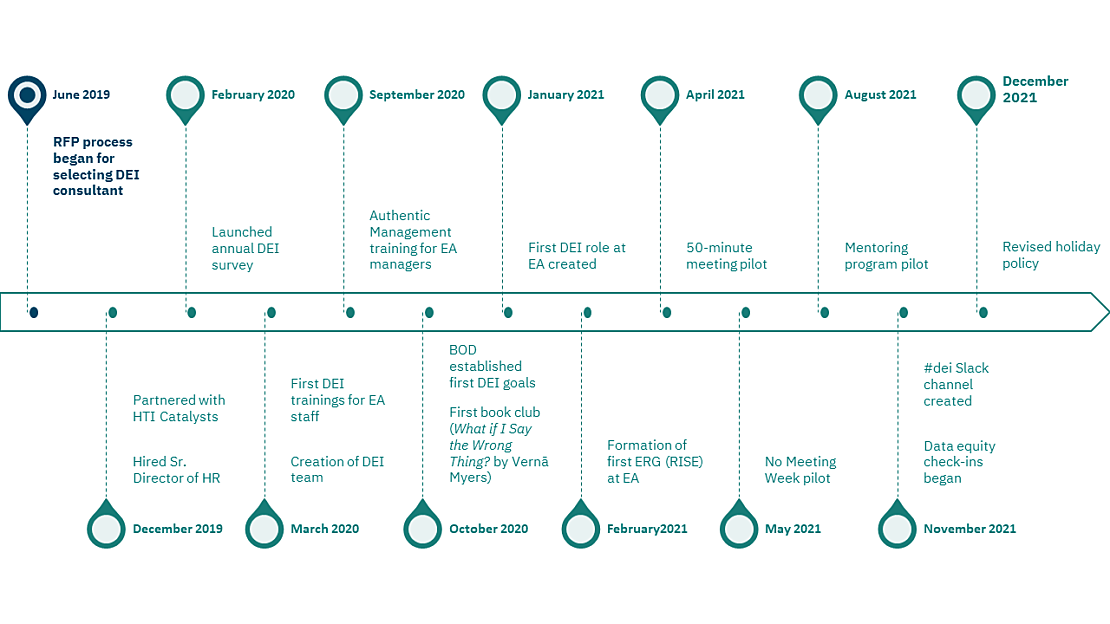What is DEI, and why do we care about it at EA?
Diversity, Equity, and Inclusion (DEI) is more than just a set of buzzwords permeating education and industry alike. Although awareness of and commitment to DEI principles has grown in recent years, DEI as a profession, and as a set of intentional practices aimed at improving workplace environments, has been around for many decades. DEI trainings in U.S. workplaces began as early as the 1960s, when equal opportunity laws and affirmative action initiatives emerged. More recently, many industries have seen a surge in the number of DEI-related job postings, as well as a more transparent commitment to DEI initiatives. The Harvard Business Review reported that 65% of respondents to a survey of 1,115 North American organizational leaders agreed that DEI is a high strategic priority for their firms.
When it comes to articulating what DEI is, it can be easy to think about each of the three components as interchangeable. But each aspect of DEI is important to tease apart, so that we can consider them not only on their own but also as a comprehensive set of ideas. We especially like the definitions provided by the University of Michigan Office of Diversity, Equity & Inclusion. They talk about DEI like attending a dance. Diversity is when everyone is invited to the party. Inclusion is when everyone gets to contribute to the playlist. Equity is when everyone has the opportunity to dance. This framing of DEI especially resonates with us at EA, because we embrace having fun, and we understand the importance of not leaving anyone out.
DEI is a philosophy that we see as deeply connected to our mission, and to our guiding principles. We pride ourselves on being an equity-focused, human-centered, and mission-driven organization. But beyond its connection to our mission and way of work, we see both a business case and a human case for making DEI a priority at EA. The business case is simple: When we work diligently towards making sure everyone has the opportunity to dance at EA, we can recruit the best talent, retain our best people, and keep our staff engaged at a high level. The human case is equally as simple, but perhaps easier to overlook as an institution: We believe it is important to care about other people. As we learn, individually and collectively, about systemic oppression and how we benefit from it, we believe we have an opportunity, individually and collectively, to interrupt and dismantle it.
What are we doing to “do” DEI?
EA embarked on our intentional DEI journey in the spring of 2019. Since then, we have both refined our focus and broadened our ambitions. Our DEI work at EA falls into three major categories:

As part of our DEI Structure & Implementation strategy, we began by taking two significant steps for our organization: We hired a Senior Director of Human Resources (now our Vice President of People Operations), and we hired an external consultant group, HTI Catalysts, to help us launch an internal DEI team and to lead DEI trainings for all of our staff. Following these key steps, we also established goals around DEI with our Board of Directors, launched an annual DEI survey for our full staff, and created a front-line role focused on DEI, which I currently serve in as the DEI and HR coordinator.
Within our Policies & Procedures, we are working on a data equity initiative that's aimed at socializing the concept of data equity at the organizational level. As part of this initiative, we are implementing data equity check-ins into key points of our project life cycles. These check-ins will ensure each project team is aligned on data equity limitations, allow each team to identify opportunities for improvement with regard to data equity, and encourage each team to implement improvements within the project when possible. In addition, our People Operations team has laid the groundwork for employee-led Employee Resource Groups (ERGs) to form, starting with an ERG for staff who identify as people of color. A major initiative we embarked on this year—that may not immediately strike some people as a DEI strategy—was to pilot a “no meeting week,” as well as internal meetings that last 50 minutes instead of a full hour. Designed to alleviate Zoom burnout accelerated by remote work during the pandemic, these changes to our meeting culture embrace a people-first philosophy aimed at increasing the inclusiveness of our workplace. The pilot proved so successful that we moved to make 50-minute internal meetings permanent, and we have scheduled a year’s worth of no-meeting days and no meeting weeks to come.
And within our Learning & Development strategy, we implemented DEI trainings facilitated by HTI Catalysts for existing and new staff. In addition, our managers attended a workshop called Authentic Management: Leading Diverse, High Performance Teams, a DEI-focused training offered by Anima Leadership. We have launched a DEI book club that focuses on cultivating cultural competency, examining systems of oppression, and fostering positive relationships at work. We carved out digital space for our DEI work by compiling a repository of resources for staff to access any time, and by initiating a #dei Slack channel for all staff to be able to share more resources, initiate DEI-related conversations, reflect on DEI topics, and have a shared space for all things DEI. Finally, we piloted a 1:1 mentoring program that pairs staff with different experience levels together to share knowledge, learn from each other, and provide support in thinking about career development. The pilot began in August and runs through the end of this year, with plans to scale the program up in the future. The timeline below shows how each of these pieces of our DEI strategy has unfolded over the past two and a half years. Then, we dive into a bit more detail into two of these initiatives: our annual survey, and our DEI trainings.
EA's annual DEI survey
In Winter of 2019-20, we launched our first internal survey to measure our institutional improvement around equity and inclusion across the organization. Our first survey combined questions from the Annie E. Casey Foundation and the Anti-Defamation League, developed in consultation with HTI Catalysts. EA arranged the logistics of preparing and sending out the survey to all staff, and the data were processed by our partners at HTI Catalysts. In Fall 2020, HTI Catalysts began our DEI trainings for staff, and during these trainings, they shared the results of the EA survey.
Results from this first survey showed that EA has taken noticeable steps towards DEI, but that there is still much more we need to do. Specifically, our survey found that along the continuum of awareness and behavior, EA currently sits in between the “Diversity Only” and “Race Tentative” points on the continuum:

In reviewing the results, the DEI team found that the survey did not gather enough actionable information about specific aspects of our organization that needed improvement, so our team sought out an alternative survey instrument to meet these goals.
For our second annual survey, launched in Summer 2021, our partners at HTI Catalysts suggested a survey from the American Institute for Certified Public Accountants, with additional edits made by our internal DEI team. It included questions addressing hiring & recruitment, belonging, harassment & discrimination, and evaluation & promotion. Currently, the DEI team is reviewing deidentified data collected from the survey, and one of our partners at HTI Catalysts is confidentially reviewing all of the data before writing a summative report with findings and recommendations for EA.
DEI trainings for staff
The DEI trainings with HTI Catalysts were one of the first systematic efforts at introducing a shared language and understanding around DEI topics for all EA staff. Planning for the trainings began in late 2019; though initially planned to be conducted in person, the COVID-19 pandemic forced us to pivot to a Zoom-based training.
The first training was held in Fall 2020, over 8 sessions held in groups of 8-10 staff. The topics covered included implicit bias, high & low context communication approaches, active & deep listening, and identity & the intersectionality of identities. It was during the first session that participants reviewed a summary report of our first DEI survey and discussed the findings. Subsequent training sessions were spent learning about the topics listed above and diving deeper into them in breakout sessions of 2-3 people.
Since then, we have conducted an additional training for our staff who joined EA after that first training in Fall 2020 (or who were not able to attend the first training). In the future, we plan to hold at least one training per year for new staff to become enculturated in the terminology and philosophies we embrace at EA around DEI, as well as ongoing trainings for existing staff to continue to deepen our DEI work.
What’s next at EA for our DEI strategy?
We have a lot in store for 2022, and beyond, when it comes to DEI at EA. We will be continuing our DEI training for all new staff in 2022. Instead of our external facilitators at HTI Catalysts, this will be facilitated internally going forward by our newly hired HR Business Partner. We just implemented a revised holiday policy, which provides flexibility to staff to select the holidays that they wish to observe, in order to be more inclusive of staff who don’t observe all of the federal holidays. We will be launching an internal mentoring program in 2022 based on feedback, successes, and lessons learned from our 2021 mentoring program pilot. The DEI team is also looking into Data Equity training for all staff and planning ongoing staff engagement events around DEI topics. We will be expanding the formation of our employee-led ERGs to include ERGs for those who identify as LGBTQ+ and as people with disabilities. Our #dei Slack channel continues to showcase resources, discussion topics, and external training and professional development opportunities for all staff to access. The People Operations team is reviewing the employee lifecycle and starting to infuse DEI into the very beginning of it: recruitment and hiring. This is just the list of what we already have in the works for next year—but we expect much more will emerge as we continue to refine and broaden our DEI strategy.

